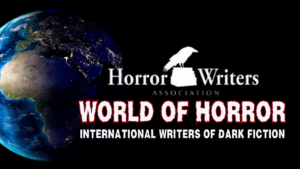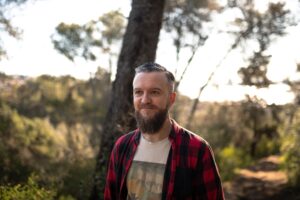World of Horror: Interview with Kev Harrison


Kev Harrison is a writer of dark fiction and English language teacher from the UK, living and working in Lisbon, Portugal where he resides with his partner in crime Ana and their two cat overlords. He’s previously lived in various cities in the United Kingdom, as well as Turkey and Poland. His subterranean horror novella, Below, is out now from Brigids Gate Press, while his debut novella, The Balance, is also available through Lycan Valley Press. His short fiction collection, Paths Best Left Untrodden is available through Northern Republic. His debut novel, Shadow of the Hidden, arrives in March 2024 through Brigids Gate Press. His short fiction has been published in a variety of magazines, podcasts and anthologies and he is a staff writer for This is Horror.
What was it about the horror genre that drew you to it?
I grew up in the 80s, when it was still generally considered okay for parents to watch scary movies with their very young kids. I remember watching The Howling when I was tiny – maybe 6 years old, and things like The Omen followed soon after, along with various Hammer Horrors. So film was the start and then my dad’s bookshelf of James Herbert and Stephen King sealed the deal.
Is there a horror tradition in your country, in your culture? A taste for horror, a market? Not necessarily literature; perhaps oral tradition too.
I think in the UK, where I grew up, it’s always been present. It had a lull, as in much of the world, in the 2000s, but has steadily been picking up again. More recently, I’ve lived in Poland and now Portugal. In Poland it was more prevalent, as are almost all sub-cultures you can think of, while in Portugal it’s more niche, but the scene we have is very devoted.
Who are some of your favorite characters in horror, internationally and/or in your own culture?
When I lived in Poland, I fell in love with the Baba Yaga figure a little bit. Much more nuanced than you might imagine from the snippets we get of her role in western lit, she often tends to act as an unfeeling barrage between man and nature in Slavic lore, which lends her an eco-horror bent, but something almost cosmic, too, in the sense of it all being so much bigger than just us. That was what brought her to the forefront of my mind when writing my novella, The Balance.
Do you make a conscious effort to include characters and settings from your country in your writing and if so, what do you want to portray?
I actually love picking up folklore as I travel, so, as well as Baba Yaga from my time in Poland, I’ve recently finished another novella about a place in France I visited last year where a significant proportion of the population are still fully invested in the idea that faeries are real and that they are in their forests daily. And this is not the nice kind of faeries. This is the child abducting kind. I’ve also spent a lot of time travelling in the middle east, which influenced my novel, Shadow of the Hidden, which comes out next spring.
What has writing horror taught you about the world and yourself?
I think the main thing writing (and reading) have taught me is that our different cultures are nuanced and different, but also have a lot of thematic concerns which are the same. We still think about living, love, loss, regret, guilt and so on. It’s the ways these emotions manifest in our stories which makes the increasingly rich tapestry of (particularly horror) fiction so interesting.
How have you seen the horror genre change over the years? And how do you think it will continue to evolve, both in the US and in your country?
I think diversity is a massive change we’re seeing right now. It’s undoubtedly a change for the better and I say that unreservedly, as a straight white man. I’m quite lucky that I grew up near London and have since lived and travelled in a wide variety of places, so I’ve always had friends, colleagues, etc of various ethnic and gender backgrounds, as well as sexualities. To now see more of these represented in fiction just means that I’m hearing more stories, more ways to tell stories and more perspectives from which to view the world, which is massively important and a change for the better.
How do you feel the International horror writing community has been represented thus far in the market and what hopes do you have for representation going forward?
I think that the growing prominence of Australasian authors like Lee Murray, Alan Baxter and Zachary Ashford has been a great start, and seeing authors from my homeland of the UK, such as Gemma Amor and Ross Jeffery receive Stoker Nominations reminds people that we’re still out here. I’ve also enjoyed more work in translation lately, Mariana Enriquez being a particular favourite of mine. The biggest obstacle is the lack of so many face-to-face events outside the US. So, it’s a long road ahead, but we’re making good steps.
Who are some international horror authors you would recommend?
Apart from those I’ve mentioned, I’ve also loved recent work by the Mexican-American, British based V. Castro, CC Adams, Stephanie Ellis, Catherine McCarthy and Dan Howarth from the UK. The Chinese-Canadian author Ai Jiang is incredible and a fabulous supporter of other writers, to boot. I’m also a huge fan of Haruki Murakami and firmly believe some of his fiction sits most comfortably in the horror genre.
What is one piece of advice you would give horror authors today?
Grow a thick skin to rejection and persist.
And to the writers from your country out there who are just getting started, what advice would you give them?
As British writers, we’re lucky that our first language is English, which gives us a huge head start. I would say one of our great weaknesses is a reluctance to push our work and market ourselves. Something about our self-deprecating sensibilities, I suppose. But if you want to find readers, you have to believe in yourself and promote your work the way you would that of someone you admire and respect.



